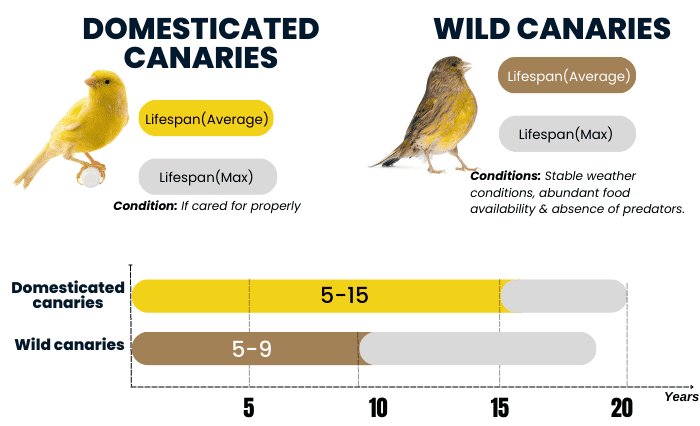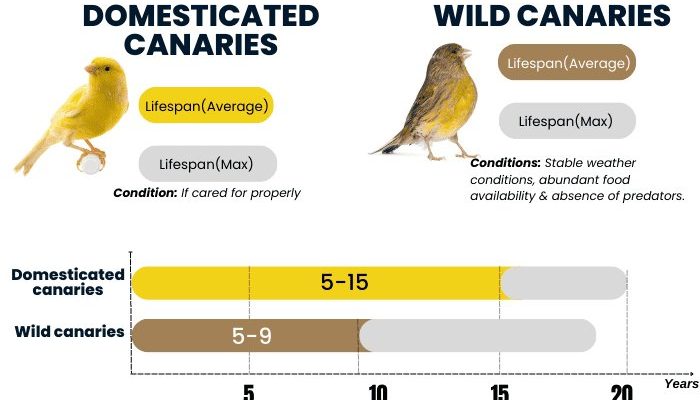
In captivity, the lifespan of a canary typically ranges from 10 to 15 years. This may vary based on numerous factors, such as genetics, diet, living conditions, and overall care. Just like how we humans have different life experiences that can affect our longevity, canaries have a lot going on in their little avian lives that can influence how long they live. Let’s dig deeper into the factors that contribute to their lifespan, so you can ensure your canary lives a long, happy life.
Understanding Canaries: A Brief Overview
Canaries belong to the finch family and are renowned for their beautiful singing and vibrant colors. These charming birds originated from the Canary Islands, hence their name. Keeping a canary can be a delightful experience, given their lively personalities and soothing songs. But knowing what makes them tick is essential. Canaries come in various breeds, such as the American Singer and Border Canary, each with unique traits and characteristics.
It’s also crucial to remember that canaries are social creatures, often thriving in environments where they have interaction—even if it’s just from a human companion. They don’t require a lot of space compared to larger birds, which makes them perfect for apartment living. However, a well-kept canary needs more than just a cage and seeds to flourish. So, let’s explore the elements that can affect their lifespan.
Factors Affecting Lifespan
Just like us, canaries have different needs and challenges they face throughout their lives. Here are the main factors influencing how long they might live:
- Genetics: Some canaries might have inherited traits that predispose them to certain health issues or longevity. So, selecting a healthy bird from a reputable breeder can make a significant difference.
- Nutrition: A balanced diet is essential. Canaries thrive on a diet of high-quality seeds, fresh fruits, and vegetables. Feeding them the right foods helps keep them healthy and active.
- Environment: The living conditions—like cage size, cleanliness, and exposure to light—play a crucial role in their health. A clean, spacious cage with proper ventilation can prevent stress and illness.
- Veterinary Care: Regular check-ups with an avian vet can help detect health issues early. Just like in humans, early diagnosis and treatment can prolong a canary’s life.
Taking care of a canary involves layers of responsibility. Understanding these factors can steer you towards making better choices for your feathery companion.
Diet and Nutrition: The Key to Longevity
You might be wondering, “What’s the best diet for my canary?” Well, nutrition is a huge factor in how long your feathered friend lives. Their diet should be varied and nutritious. Here’s what you can include:
- Seeds: A mix of high-quality canary seeds is essential. However, they shouldn’t be the only food! Look for seed brands that include a variety of grains.
- Fresh Fruits and Vegetables: Adding treats like apples, carrots, and leafy greens helps provide necessary vitamins and minerals. Just make sure to wash them thoroughly and chop them into small, manageable pieces.
- Pellets: Some owners choose to supplement their canaries’ diets with specially formulated pellets designed for birds. These can help ensure they’re getting enough nutrients without being picky eaters.
Moreover, don’t forget about providing fresh water daily. Clean water can sometimes be overlooked, but it’s vital for your canary’s health and longevity.
Proper Living Conditions: Creating a Happy Home
The environment you create for your canary is just as important as what you feed them. A suitable cage setup can increase their lifespan significantly. Here are some vital aspects to consider:
- Cage Size: Canaries need enough space to fly around. A cage that is at least 24 inches tall and 18 inches wide is a good start. The more room they have, the happier they’ll be!
- Cage Accessories: Include perches of different sizes and materials, toys to stimulate their minds, and plenty of places to explore. A well-furnished cage can help prevent boredom and stress.
- Cleaning: Regularly cleaning the cage is crucial. Removing droppings, uneaten food, and changing the bedding helps reduce the risk of diseases that could shorten their lifespan.
Creating a stimulating environment isn’t just about space; it’s about giving your canary the chance to be active and engaged.
Socialization: The Impact of Interaction
Canaries are inherently social creatures. While they are often kept alone, they do benefit from interaction—whether it’s with other canaries or their human caretakers. Here’s why socialization matters:
- Companionship: While canaries can thrive on their own, having a buddy can make a difference. If you consider getting another canary, just make sure the cage is large enough to accommodate both birds comfortably.
- Human Interaction: Spending time with your canary by talking, whistling, or letting them out for some supervised flight time can keep their spirits high. A happy bird is often a healthier bird.
- Stimulation: Canaries love to sing and mimic sounds. Introducing them to music or sounds from different environments can spark their interest and keep their minds active.
Your canary thrives on love, care, and interaction—just like any other pet. The more you engage with them, the better they’ll thrive, leading to a longer, healthier life.
Common Health Issues: What to Watch For
Despite our best efforts, canaries can still face health challenges that might affect how long they live. So, what should you be on the lookout for?
- Respiratory Issues: Signs like wheezing or difficulty breathing are red flags. These could be signs of respiratory infections or other health problems.
- Obesity: Overfeeding can lead to obesity, which can shorten a canary’s lifespan. Keep an eye on their weight and adjust their diet as needed.
- Feather Plucking: This behavior can signify stress, boredom, or health issues. If your canary starts plucking feathers, it’s worth investigating.
Regular vet check-ups are a good way to ensure your canary remains in tip-top shape. Early detection can make a huge difference in treatment outcomes.
Maximizing Your Canary’s Lifespan
To sum it all up, you have the ability to significantly impact how long your canary lives through your care and attentiveness. Here are some straightforward steps to help you maximize your canary’s lifespan:
- Keep their diet varied and nutritious.
- Maintain a clean, spacious, and stimulating environment.
- Provide social interaction and companionship.
- Monitor for any health issues and seek veterinary advice when necessary.
By following these guidelines, you’re not just enhancing their quality of life; you’re also giving your canary every chance to thrive for years to come.
In the end, knowing how long canaries live isn’t just about numbers—it’s about creating a rich, fulfilling life for your feathered friend. So, whether you’re thinking about getting a canary or already have one, remember that the love and care you provide can make all the difference in how long they stay by your side.

